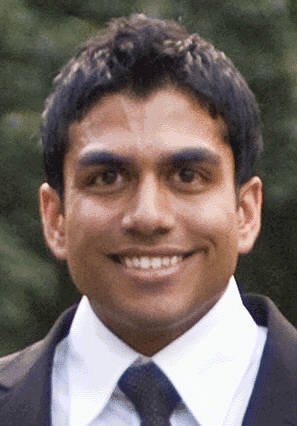A meta-analysis of the literature suggests that oncologic and voice quality results are similar if patients with early-stage glottic cancer are treated with either transoral laser surgery or external beam radiotherapy.
The optimal treatment for early-stage glottic cancer remains controversial, said Manish D. Shah, MD, MPhil, a resident in the Department of Otolaryngology-Head and Neck Surgery at Sunnybrook Health Sciences Centre at the University of Toronto. There appears to be similar oncologic control with external beam radiotherapy, open partial laryngectomy, and transoral laser surgery. The five-year locoregional control is around 90 percent.
 Doctors should consider the potential morbidity of treatment and cost and utilization of health care resources and patient preference in considering which treatment would work best in each individual.
Doctors should consider the potential morbidity of treatment and cost and utilization of health care resources and patient preference in considering which treatment would work best in each individual.-Manish D. Shah, MD, MPhil
In a presentation during the 111th annual meeting of the Triological Society, conducted in conjunction with the Combined Otolaryngology Spring Meeting, Dr. Shah described how his research team evaluated dozens of reports and articles in attempting to compare clinically meaningful outcomes of laser and radiotherapy regimens.
Previous research suggests that external beam radiotherapy is associated with improved post-treatment voice outcome, Dr. Shah said. Transoral laser surgery may offer shorter treatment duration, improved treatment-related morbidity, reduced costs and reduced use of health care resources, and similar voice outcomes when compared with external beam radiotherapy.
His study explored whether the oncologic outcomes between the two modalities were comparable. Our objectives were to conduct a systematic review of existing studies to compare transoral laser surgery and standard fractionated external beam radiotherapy in the treatment of early-stage [T1 and T2] glottic cancer.
Dr. Shah said that the primary outcomes of his study were the five-year local oncologic outcomes (local control, overall survival, and laryngectomy-free survival). The secondary outcome was post-treatment voice quality.
The research team pored over the medical literature, both looking at published data and attempting to uncover unpublished material that was pertinent to the research.
Two reviewers screened abstracts and titles, and relevant articles were reviewed with blinding to authors, institution and journal source. In regard to the oncologic outcomes, we identified 28 studies, all done retrospectively, including six head-to-head studies and 22 single-arm consecutive case series. The single-arm studies included 10 using external beam radiotherapy and 12 using transoral laser surgery.
Dr. Shah said that a total of 7676 patients were involved in the studies. Of these patients, 5105 underwent external beam radiotherapy, whereas 2571 had transoral laser surgery.
Meta-Analysis Results
After reviewing the studies and compiling the statistics, the researchers reported the following results:
- Local control appears to favor transoral laser surgery, with a pooled odds ratio of 0.81 ([95% CI 0.51-1.3] p = 0.38). However, these results did not reach statistical significance, he said.
- Laryngectomy-free survival appears to favor transoral laser surgery, with a pooled odds ratio of 0.73 ([95% CI 0.39-1.35] p = 0.31). That, too, was not statistically significant, he said.
- Overall survival favors transoral laser surgery with a pooled odds ratio of 1.48 ([95% CL 1.19-1.85] p = 0.0004). However, the small effect is not clinically meaningful, although statistically significant, he said.
Vocal Quality
Dr. Shah and colleagues identified nine-head-to-head studies that compared vocal outcomes. Again, he noted that all the studies were retrospective. The studies employed various objective and subjective outcome measures.
In the secondary endpoint of voice quality, we measured maximum phonation time, fundamental frequency, phonation intensity, and range, he said. Overall, the differences were not significant (p = 0.54). Stroboscopic analysis of mucosal waveform showed no statistical difference (p = 0.72); and the GRBAS (grade, roughness, breathiness, asthenia, strain) scale showed no statistical significance (p = 0.64). Subjective voice evaluation-normal versus mild versus severe dysphonia-showed no statistical significant differences (p = 0.64).
 What he showed is that these two treatment modalities are equivalent. I think most people believe that. It would also be reassuring to doctors who use these modalities.
What he showed is that these two treatment modalities are equivalent. I think most people believe that. It would also be reassuring to doctors who use these modalities.-Mark C. Weissler, MD
We found trends favoring transoral laser surgery for improved local control, laryngectomy-free survival, and overall survival, but there was no significant difference in oncologic outcomes, Dr. Shah said. There was a trend favoring voice quality using external beam radiation.
Interpreting the Data
Mark C. Weissler, MD, the J.P. Riddle Distinguished Professor of Otolaryngology at the University of North Carolina- Chapel Hill, who moderated the session at which Dr. Shah delivered his paper, said, He tried to sort of make a case that surgical resection might be better, but it wasn’t supported by his data.
I think what he showed is that these two treatment modalities are equivalent. I think most people believe that. It would also be reassuring to doctors who use these modalities, said Dr. Weissler, who is also Chair of the UNC Clinical Cancer Advisory Committee and a clinical researcher at the Lineberger Comprehensive Cancer Center.
Dr. Shah acknowledged that his study was limited by few head-to-head comparisons, limited sample sizes, methodological issues of the studies, and poor correlation between objective and subjective measures.
There were no randomized clinical trial data, he said. The results were pooled analyses from retrospective studies. It was also limited by the duration of patient enrollment, as well as variability between studies regarding length of follow-up, tumor stage information, and staging criteria.
He said, however, that this study appears to be the first to compare the treatment modalities using meta-analytic techniques. We found oncologic control was most likely equivalent, and there was no clear difference in voice outcomes. Doctors should consider the potential morbidity of treatment and cost and utilization of health care resources and patient preference in considering which treatment would work best in each individual.
©2008 The Triological Society
Leave a Reply